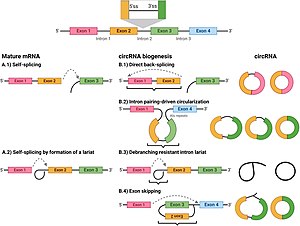
B.1) direct back splicing;
B.2) Intron pairing driven circularization;
B.3) debranching resistant intron lariat;
B.4) lariat-driven circularization (exon skipping).
In molecular biology, circular RNA (or circRNA) is a type of single-stranded RNA which, unlike linear RNA, forms a covalently closed continuous loop. In circular RNA, the 3' and 5' ends normally present in an RNA molecule have been joined together. This feature confers numerous properties to circular RNA, many of which have only recently been identified.
Many types of circular RNA arise from otherwise protein-coding genes. Some circular RNA have been shown to code for proteins.[1][2] Some types of circular RNA have also recently shown potential as gene regulators. The biological function of most circular RNA is unclear.
Because circular RNA do not have 5' or 3' ends, they are resistant to exonuclease-mediated degradation and are presumably more stable than most linear RNA in cells.[3] Circular RNA has been linked to some diseases such as cancer.[4]
- ^ Dawoud A, Ihab Zakaria Z, Hisham Rashwan H, Braoudaki M, Youness RA (March 2023). "Circular RNAs: New layer of complexity evading breast cancer heterogeneity". Non-Coding RNA Research. 8 (1): 60–74. doi:10.1016/j.ncrna.2022.09.011. PMC 9637558. PMID 36380816. S2CID 252890235.
- ^ Pamudurti NR, Bartok O, Jens M, Ashwal-Fluss R, Stottmeister C, Ruhe L, et al. (April 2017). "Translation of CircRNAs". Molecular Cell. 66 (1): 9–21.e7. doi:10.1016/j.molcel.2017.02.021. PMC 5387669. PMID 28344080.

- ^ Jeck WR, Sorrentino JA, Wang K, Slevin MK, Burd CE, Liu J, et al. (February 2013). "Circular RNAs are abundant, conserved, and associated with ALU repeats". RNA. 19 (2): 141–157. doi:10.1261/rna.035667.112. PMC 3543092. PMID 23249747.
- ^ Vromman M, Vandesompele J, Volders PJ (January 2021). "Closing the circle: current state and perspectives of circular RNA databases". Briefings in Bioinformatics. 22 (1): 288–297. doi:10.1093/bib/bbz175. PMC 7820840. PMID 31998941.